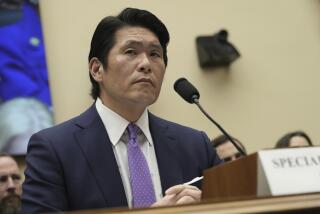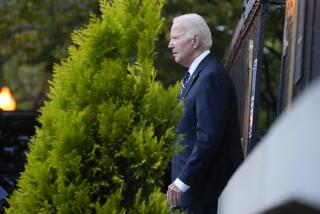First Lady’s Acts After Aide’s Death Told : Whitewater: A White House attorney testifies that she ‘may have been concerned’ about granting ‘unfettered access’ to Vincent Foster’s office.
- Share via
WASHINGTON — A White House attorney said Thursday that he learned shortly after the suicide of Deputy Counsel Vincent Foster in 1993 that First Lady Hillary Rodham Clinton did not want to grant “unfettered access” to Foster’s office.
The testimony of Stephen R. Neuwirth was greeted by Republicans on the Senate Whitewater committee as evidence that the First Lady may have been part of what they believe was an effort by top White House officials to obstruct the investigation of Foster’s death on July 20, 1993.
Mrs. Clinton’s actions were discussed repeatedly during Thursday’s hearing, which also focused on perplexing discrepancies in the recollections of White House witnesses. Judging from these unexplained conflicts, Sen. Robert F. Bennett (R-Utah) said he was forced to conclude that the White House “was acting as if there was something to hide.”
Republicans have long suspected that White House officials interfered with the suicide investigation because they feared police would uncover an embarrassing personal secret about the Clintons--perhaps relating to their investment in the Whitewater land deal in Arkansas.
At the time of his death, Foster, a childhood friend of the President and a former law partner of the First Lady, was working on a number of issues involving the Clintons’ personal finances, including the creation of a blind trust for their holdings.
Neuwirth and Clifford Sloan, a former White House attorney who also testified Thursday, were extremely combative when questioned by Republicans.
Under intense questioning, Neuwirth said that he did not know whether his boss at the time, then-White House Counsel Bernard Nussbaum, was acting on orders from Mrs. Clinton when Nussbaum barred police from inspecting documents in Foster’s office two days after the suicide. He said that he did not know whether Nussbaum discussed it with her.
But, he said, he and his boss had a brief conversation shortly after Nussbaum talked by telephone with the First Lady’s friend, Susan Thomases, a New York attorney. As a result, he said, “my understanding was that Mr. Nussbaum felt that Ms. Thomases and the First Lady may have been concerned about anyone having unfettered access to Mr. Foster’s office.”
Neuwirth said that Mrs. Clinton came to the White House counsel’s office on July 26, 1993, shortly after a so-called suicide note was found torn up at the bottom of Foster’s briefcase. He said he could not remember what she said or whether she read the note.
“I recall she looked taken aback,” he said.
He also could not explain why a memo based on his interview with police investigators a few days later did not mention that the note had been shown to Mrs. Clinton. According to the memo, Neuwirth named five people who saw the note, but excluded the First Lady.
More to Read
Get the L.A. Times Politics newsletter
Deeply reported insights into legislation, politics and policy from Sacramento, Washington and beyond. In your inbox twice per week.
You may occasionally receive promotional content from the Los Angeles Times.










